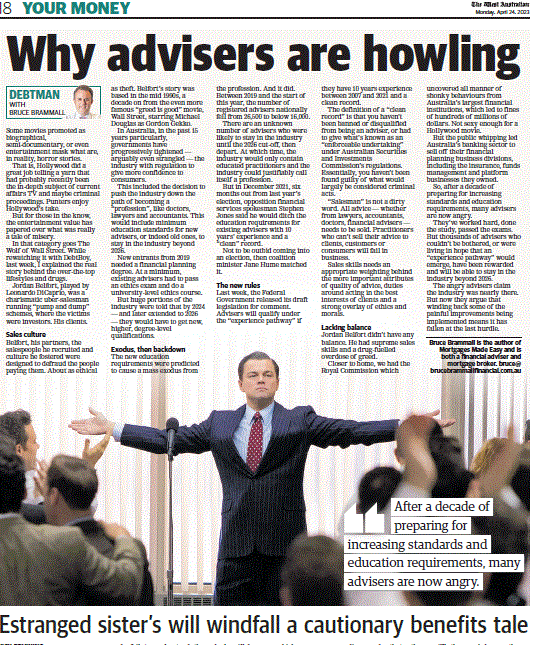
Bruce Brammall, The West Australian, 24 April, 2023
Some movies promoted as biographical, semi-documentary, or even entertainment, mask what are, in reality, horror stories.
That is, Hollywood did a great job telling a yarn that had probably recently been the indepth subject of current affairs TV and maybe criminal proceedings.
Punters enjoy Hollywood’s take. But for those in the know, the entertainment value has papered over what was really a tale of misery.
In that category goes The Wolf of Wall Street. While rewatching it with DebtBoy, last week, I explained the real story behind the over-the-top lifestyles and drugs.
Jordan Belfort, played by Leonardo DiCaprio, was a charismatic uber-salesman running “pump and dump” schemes, where the victims were investors. His clients.
Sales culture
Belfort, his partners, the salespeople he recruited and culture he fostered were designed to defraud the people paying them. About as ethical as theft.
Belfort’s story was based in the mid 90s, a decade on from the even more famous “greed is good” movie, Wall Street, starring Michael Douglas as Gordon Gekko.
In Australia, in the last 15 years particularly, Governments have progressively tightened (arguably even strangled) the industry with regulation to give more confidence to consumers.
This included the government’s decision to push the industry down the path of becoming a “profession”, like doctors, lawyers and accountants. This would include minimum education standards for new advisers, or indeed, to stay in the industry beyond 2026.
New entrants from 2019 needed a financial planning degree. At a minimum, existing advisers had to pass an ethics exam and do a university-level ethics course.
But huge portions of the industry were told that by 2024 (later extended to 2026) they would have to get new, higher, degree-level qualifications.
Exodus, then backdown
The new education requirements were predicted to cause a mass exodus from the profession. And it did. Between 2019 and the start of this year, the number of registered advisers fell from 26,500 to below 16,000.
There are an unknown number of advisers who were likely to stay in the industry until the 2026 cutoff, then depart.
At which time, the industry would only contain educated practitioners and the industry could justifiably call itself a profession.
But, in December 2021, six months out from last year’s election, Opposition financial services spokesman Stephen Jones said he would ditch the education requirements for existing advisers with 10 years’ experience and a “clean” record.
Not to be outbid coming into an election, then coalition minister Jane Hume matched it.
The new rules
Last week, the government released its draft legislation for comment. Advisers will qualify under the “experience pathway” if they have 10 years’ experience between 2007 and 2021 and a clean record.
The definition of a “clean record” is that you haven’t been banned or disqualified from being an adviser, or had to give what’s known as an “enforceable undertaking” under ASIC’s regulations. Essentially, you haven’t been found guilty of what would largely be considered criminal acts.
“Salesman” is not a dirty word. All advice – whether from lawyers, accountants, doctors, financial advisers – needs to be sold. Practitioners who can’t sell their advice to clients, customers or consumers, will fail in business.
Sales skills needs an appropriate weighting behind the more important attributes of quality of advice, duties around acting in the best interests of clients, and a strong overlay of ethics and morals.
Lacking balance
Jordan Belfort didn’t have any balance. He had supreme sales skills and a drug-fuelled overdose of greed.
Closer to home, we had the Royal Commission which uncovered all manner of shonky behaviours from Australia’s largest financial institutions, which led to fines of hundreds of millions of dollars.
Not sexy enough for a Hollywood movie.
But the public whipping led Australia’s banking sector to sell off their financial planning business divisions, including the insurance, funds management and platform businesses they owned.
So, after a decade of preparing for increasing standards and education requirements, many advisers are now angry.
They’ve worked hard, done the study, passed the exams. But thousands of advisers who couldn’t be bothered, or were living in hope that an “experience pathway” would emerge, have been rewarded and will be able to stay in the industry beyond 2026.
The angry advisers claim the industry was nearly there. But now argue that winding back some of the painful improvements being implemented means it has fallen at the last hurdle.
Bruce Brammall is the author of Mortgages Made Easy and is both a financial adviser and mortgage broker. E: bruce@brucebrammallfinancial.com.au.